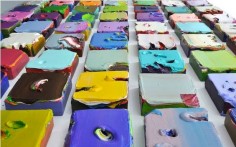JANE LEE
Джейн Ли
ジェーン·リー
50 Faces
source: artsrepublic
Singaporean artist Jane Lee presents new work in a solo exhibition titled 100 Faces. Known for her highly tactile and visually spectacular paintings, she makes a bold stylistic leap with 100 Faces, focusing her considerable talents on three new series: Faces, Stacks and Portraits.
Up to now, Lee has been using the very process and materials of painting as the subject of her work. Experimenting with innovative techniques, materials and tools, Lee has been examining the way paintings are constructed by treating the components of a painting—stretcher, canvas, and the paint itself—in new ways. In the process, she raised provocative questions about the significance of painting and the relevance of contemporary art practice.
“Thus far I have largely focused on experimenting with various techniques of creating paintings, for instance, building layers upon a plane,” says Lee. “It occurred to me that this process of building up the surface might be influenced by Western practices. This led me to rethink my practice. I started to bring in some experiences of Eastern philosophy, in particular, Chinese painting, where the empty spaces are often the focal point for creating the essence of what the painting attempts to represent.”
In the process of examining these influences, Lee began to employ a new approach—subtracting from the surface rather than building on it. Shifting away from highly texturized works, such as Beyond the Blue (2011), a sculpted mass of extruded paint that cascades down the wall collapsing onto itself, Lee’s new work aims to arouse the viewer’s curiosity as to what lies beneath.
This concept is beautifully illustrated in the Portrait series, comprising eight paintings with predominantly smooth, white surfaces that have been poked, jabbed and scraped to reveal swaths of opulent color hidden below the surface. A deeper look into the chasms of color reveals Lee’s process: She’s abandoned brushes in favor of a palette knife and her bare hands. She layers different colors of thick, acrylic gel paint, which merge in unexpected ways. She then deconstructs the paining by gouging and scooping the surface with her fingers to forcefully reveal the paintings’ colorful secrets.
In 100 Faces – one hundred deliciously colored small-scale paintings laid out in a dazzling grid—Lee continues to explore the multiple “faces” of painting.
In the Stack series, three chromatic pillars of paintings, piled high with only their edges exposed, challenge our perception of how a painting should be viewed. Curiosity compels the viewer to twist and crane his or her neck in an effort to see the face of the painting, which—except for the fortunate collector who owns the entire stack—will likely remain a mystery.
If these works draw parallels to edible confections, it’s not an accident. Jane Lee’s work often alludes to food and, as with previous bodies of work, she has used tools and techniques from the kitchen. Here, she treats the paint like cream, generously slathering on layers with a pallet knife, as if frosting a cake. The results incite a desire to literally consume the work.
Sundaram Tagore Gallery will also be presenting a large-scale work by Jane Lee in the Platforms area at Art Stage Singapore 2014: 50 Faces, 2013, a 10-meter long installation of fifty paintings, each measuring 15 cm x 15 cm x 5 cm, made of acrylic heavy gel, reflective mirror and fiberglass base. Art Stage will be held January 16-19, 2014.
Jane Lee has won numerous awards, including the Celeste Prize in New York. She was a finalist for the 2007 Sovereign Art Prize and was the first recipient of the Singapore International Residency Art Prize in 2007. Her work Raw Canvas was showcased at the Singapore Biennale 2008 and Collectors’ Stage at the Singapore Art Museum in 2011.
Lee holds a BA in fine arts and a diploma in fashion from LASALLE College of the Arts in Singapore. She has participated in numerous exhibitions in museums and galleries in Asia and Europe, among them the Singapore Art Museum, the Hong Kong Arts Centre, and the Contemporary Art Center in Vilnius, Lithuania.


